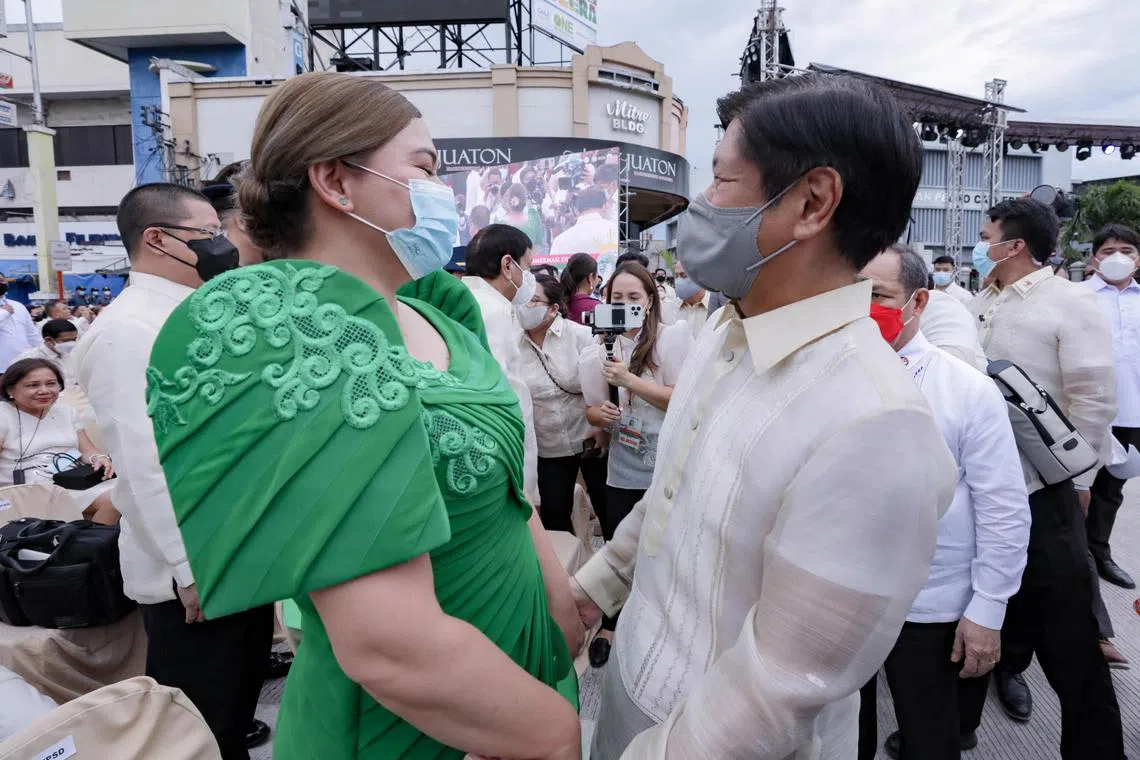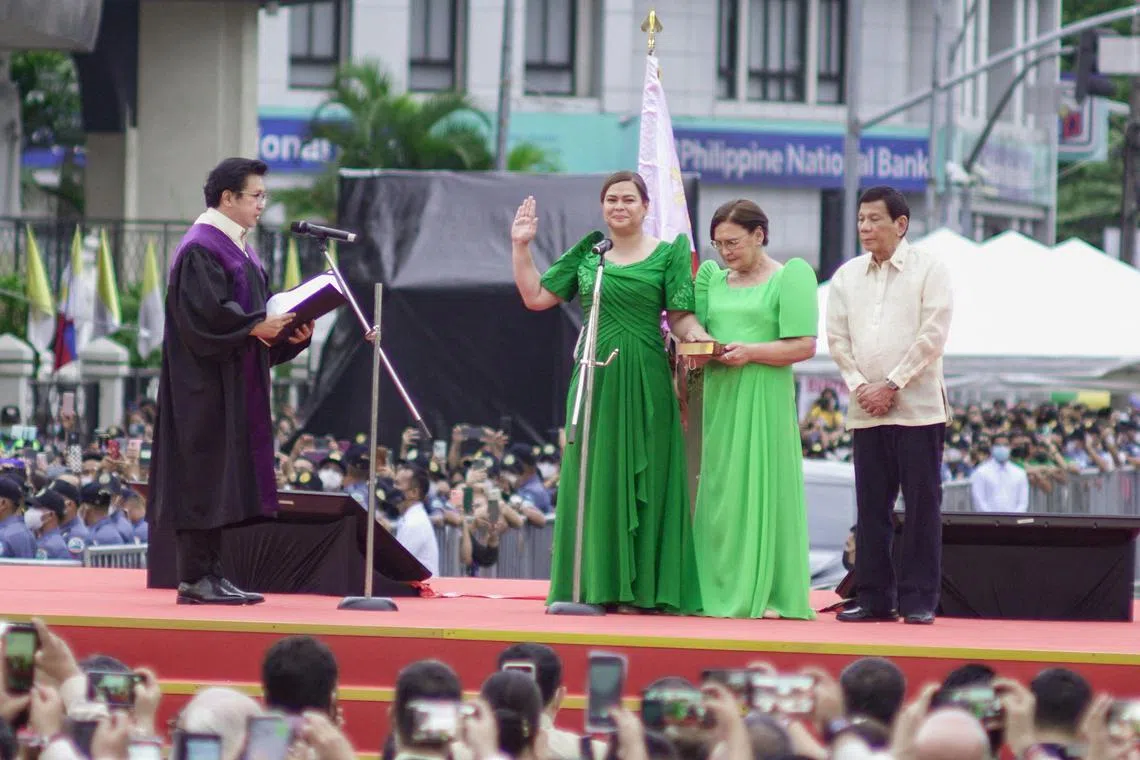The Marcos-Duterte ticket won. Can this Philippine alliance last?
Sign up now: Get insights on Asia's fast-moving developments

Philippines Vice president-elect Sara Duterte (left), and President-elect Ferdinand 'Bongbong' Marcos Junior during her inauguration ceremony in Davao City, Philippines on June 19, 2022.
PHOTO: EPA-EFE
DAVAO CITY, Philippines – When President Ferdinand Marcos Jr hugged his vice-presidential running mate Sara Duterte at her inauguration in June, it looked like a euphoric moment in the Philippines: two of the nation’s most prominent political families coming together in the name of unity after landslide election victories.
But the fact that she had decided to have her own ceremony separate from his and the behaviour of her father, Mr Rodrigo Duterte, the former president, spoke to the tensions near the surface.
As everyone embraced and shook hands with his daughter, Mr Duterte grimaced, tight-lipped and impatient. He stood stiffly next to Mr Marcos, his successor as president, during a photo op. Rather than hug any of the Marcoses there to congratulate his daughter on her vice-presidential win, he walked away.
The scene was emblematic of the political balancing act going on in the Philippines, the oldest treaty ally of the United States in South-east Asia and a key security partner for Washington.
Any instability in the country could weigh on future foreign policy decisions amid the Biden administration’s efforts to redouble US ties in the region, where China is increasingly trying to gain influence. Last week, Mr Marcos visited the country’s leader Xi Jinping.
Critics have warned that the Marcos-Duterte administration is little more than a marriage of convenience between two notorious families out to protect their own interests. Policy disagreements have already emerged.
Though Mr Marcos defended Mr Duterte’s vicious war on drugs, for example, he has taken a much softer approach as president, drawing his country closer to the US, which Mr Duterte once called a “lousy” nation.
Ms Duterte has shown that she will not be an ordinary vice-president, a role that typically exists in the shadows of the president. Her budget is already three times the size of her predecessor, Ms Leni Robredo.
Allegiance in the Philippines has long been determined by bloodlines and regional loyalties, with political dynasties jockeying for power and influence.
That system was born centuries ago during Spanish colonial rule and later flourished under the Americans, who introduced democratic elections but limited the vote to landowning aristocrats.
In that vacuum, family names flourished. Today, up to 70 per cent of Congress is made up of just a few families.
Now, all eyes are on the Marcoses and the Dutertes as they try to improve the lives of millions of Filipinos and deliver on the promise of national unity in spite of a political system that has tended to favour factionalism.
“The problem in Philippine politics, historically, is that such a big alliance is hard to maintain,” said Mr Aries Arugay, who studies Philippine electoral politics. “There’s so many interests to take into account, there’s so many mouths to feed. And sooner or later, there will be dissatisfaction and discontent.”

Philippines’ Vice President-elect Sara Duterte (centre) takes her oath before supreme court associate justice Ramon Hernando (left) and her mother Elizabeth Zimmerman and outgoing president Rodrigo Duterte (right) during the inauguration ceremony on June 19, 2022.
PHOTO: AFP
Among the political establishment in the Philippines, no family has embedded itself quite as thoroughly as the Marcoses.
The father Ferdinand E. Marcos ruled with an iron fist for more than two decades. The mother Imelda was elected four times to the House of Representatives.
The younger Marcos, known by his childhood nickname “Bongbong”, has been the vice-governor and governor of a province, a congressman and a senator.
His older sister Imee is a senator, too. His son, Sandro, was elected to Congress last year, and a cousin, Mr Martin Romualdez, is the Speaker of the House.
In October 2021, three weeks after Mr Marcos announced that he would run for president,
The two politicians hardly knew each other, but Ms Imee Marcos and Ms Duterte were friends. Before the meeting, Ms Imee Marcos had given Ms Duterte a folder with arguments in favour of a Marcos-Duterte ticket, according to Mr Mike Acebedo Lopez, a relative of both politicians.
On one page, it had a picture of a smiling Ms Duterte with the title: The Indomitable Sara. A Narrative of Hope.
Until that meeting, Ms Duterte had not seriously considered running for vice-president. Intrigued by the proposal, she commissioned surveys focused on her potential. They showed that voters would handily support her in the role.
Ten days after the meeting, Mr Marcos stunned the country by announcing that Ms Duterte would run for vice-president
Mr Duterte later told reporters that his daughter had not consulted him about her plans. He lashed out by calling Mr Marcos a “weak leader” and a “spoiled child”. The person he had hoped would continue his legacy was his favourite among his four children, Sara.
“We were all shocked,” said Mr Amado Santos Munda Jr, a family friend. “Everybody thought that his daughter will be president because of the surveys. And remember that usually in the Philippines, the president’s children become presidents.”
Ms Duterte’s spokesman, Mr Reynold Munsayac, said that “some parts” of this account of the meeting in Cebu City were incorrect, but that Ms Duterte “does not wish to elaborate”. Mr Marcos’ office did not respond to repeated requests for comment.
Fundamental family interests
Since taking office, Mr Marcos and Ms Duterte have worked hard to project a unified political front. Ms Duterte recently defended the use of the phrase “New Society” in a new textbook referring to the martial law years, brushing off complaints that it was another example of the Marcoses trying to downplay the father’s brutal dictatorship.
Both families have patriarchs accused of human rights abuses and corruption, and are facing multiple legal challenges. So far, they have moved in lock step to protect one another.
The administration announced in September that it had rejected a request by the International Criminal Court to continue an investigation into Mr Duterte’s violent war on drugs. A tax evasion case against Mr Marcos has been put on hold, though the family still owes billions in unpaid estate taxes to the government.
Ms Robredo, the main opposition candidate in the presidential race, attracted a groundswell of support from young voters during the election in part for her dedication to rooting out the corruption.
Fearful of Ms Robredo’s grassroots movement, the Estradas and the Arroyos, two former presidential families who were once prosecuted for corruption in the Philippines, backed the Marcos-Duterte ticket.
“That is our challenge right now,” said Mr Ronald Mendoza, a former dean of the Ateneo School of Government, referring to political dynasties. “We know that they are not healthy for our democracy, and yet it’s becoming normalised.”
With Mr Marcos’ backing, Ms Duterte has been given US$2.6 million (S$3.46 million) in funds that were meant for intelligence operations because she says she needs to make schools safer. She has also asked for US$41.2 million from Congress for her office.
‘She has a mind of her own’
Few alliances between two families have survived for very long in the Philippines. The last time a powerful alliance fractured was in 1987, when Mr Salvador Laurel, then the vice-president, broke with then President Corazon Aquino. Their split added to the turmoil that gripped the country after the end of martial law imposed by the Marcos dictatorship.
Several analysts point to Ms Duterte’s separate inauguration ceremony and Mr Marcos’ decision to also appoint her education secretary – instead of defence, as she had requested – as a sign of brewing tension.
Ms Duterte told a Times reporter that she was not disappointed with the job Mr Marcos gave her, saying “the defence portfolio was a discussion we had before we became a tandem”.
Dr Ramon Beleno III, a political science professor at the Ateneo De Davao, said Mr Marcos’ decision to deny Ms Duterte the defence portfolio suggested that he was concerned about giving her a more crucial role. “Then she might end up overshadowing him,” he said. NYTIMES


